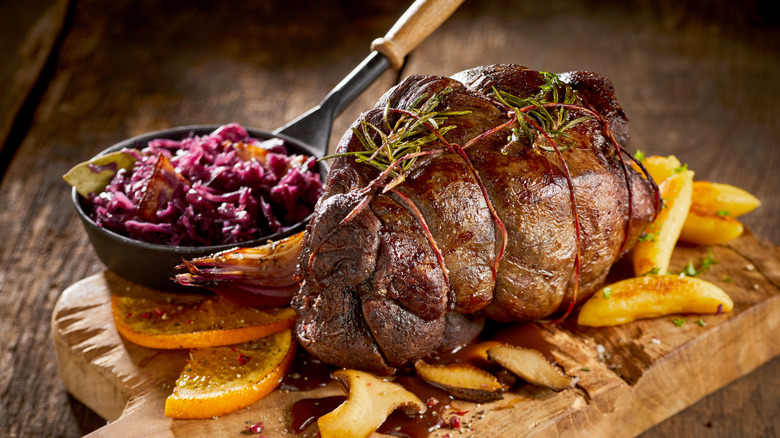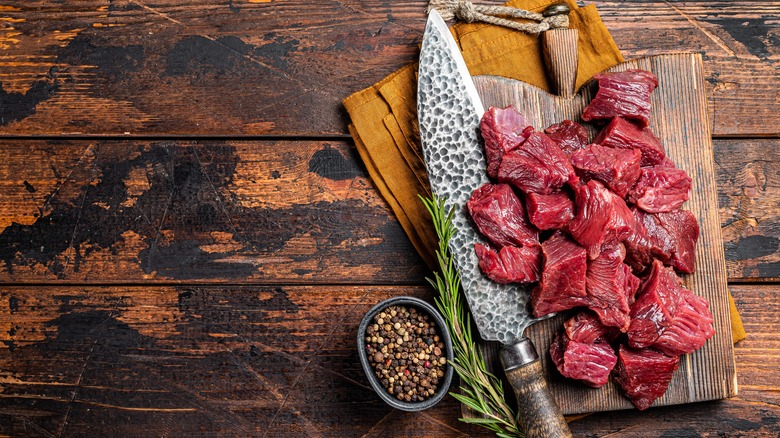Cook Venison In Your Slow Cooker To Tame That Gamey Flavor
Even among carnivores, venison can be a pretty polarizing protein. While some might swear by a venison meatloaf that's loaded with flavor, others might politely decline. There's a good chance that aversion comes from the fact that venison has a reputation for being on the gamey side, and that word is often enough to turn many people away. There's good news, though: It doesn't have to be that way.
There's a few ways that you can get rid of that gamey flavor and take the edge off. Soaking venison in milk is one tried and true way of toning down the gaminess, and you can also opt for breaking out the slow cooker. Sure, you might have those friends, relatives, and neighbors who love the strong taste of their wild venison and cranberry sausages, but for those who haven't been sold on the idea of eating deer, cooking it low and slow will mellow out those overpowering flavors and might just turn venison into a staple.
It's also worth noting just what "venison" is, because while it's generally thought of as referring to deer, it's actually a much broader term. It also includes animals like reindeer, elk, moose, and antelope, and depending on where you live, you might also have access to these other types of wild meats. The slow cooker will be a valuable tool in the preparation of any of them.
What is a gamey flavor, and why does slow cooking get rid of it?
First, what does "gamey" actually mean? Gaminess refers to a distinctive, strong flavor that's present in the meat of wild animals. It's often described as metallic, and there's a good reason for that. Since wild animals live a life on the run and on the move — in sharp contrast to the more sedentary, relaxed life of domesticated livestock — it means they have a stronger cardiovascular system and more blood circulation. That develops into an iron-rich meat and a stronger flavor.
Those who are used to having farm-raised animals making it to the dinner table might not be used to that sometimes overpowering flavor, but as long as the animal was prepared and processed correctly and quickly, it is possible to tone that down by slow cooking.
There's a few things that happen during the long process of slow cooking, starting with the breakdown of connective tissues. Because of a deer's wild lifestyle, the meat generally doesn't contain the fat that makes farm-raised animals so tender. That can add an unpleasant toughness to the gamey flavor, but slow cooking dissolves tough tissues and preserves moisture while also mellowing out the metallic taste. Cutting venison into small pieces, adding flavorful marinades and spices, and slow cooking (but not overcooking) will help you serve up a tender piece of meat with none of the unfamiliar, strong, and sometimes unwanted flavors of iron-rich meat.
There are many benefits to adding venison to your meal plan
When it comes to proteins, venison might not be up there among more popular options like beef, chicken, and pork, but it should be — particularly because it's so easy to use methods like slow cooking to reduce the gamey flavor that many people find questionable. Why should it be a go-to? For starters, venison contains many essential amino acids and nutrients. It's high in protein, and it's also rich in a something called haem iron, a specific type of iron that our bodies can absorb, process, and use easily.
Because it's a lean meat, it's also been found to be a great option for people who have been diagnosed with cardiovascular conditions or high cholesterol. When compared to other red meats, venison is lower in saturated fat, and when it comes to foods, it's one of the top sources of zinc and B vitamins.
Venison is a nutritional powerhouse, but there's an environmental and sustainability factor here, too. In many places, being hunted by humans keeps native deer populations at healthy levels, and that's vital. When deer populations get out of control, they can have devastating impacts on the other species they share their habitats with, spread diseases like Lyme, and spill over into populated areas to cause car accidents and other conflicts with humans. Should you eat deer? Absolutely, and you can convince even the most adamant naysayers with some delicious, slow cooked venison roast.


